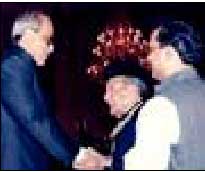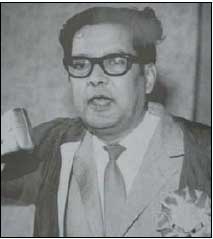Anis Khurshid and His Impact on International Librarianship
By Zahiruddin Khurshid
Dharan, S. Arabia

Prof Anis Khurshid receives a civil award from
President Leghari (above) and delivers a lecture at
the Karachi University (below)

Lester Asheim, the former Dean and Professor at the University of Chicago Graduate Library School and a distinguished leader in comparative and international librarianship, says that one of the many facets of Anis Khurshid that has earned him world-wide admiration and respect is the part he has played as a force in breaking down the cultural barriers that so infrequently intervene among and between countries, even in professional sectors.
The purpose of writing this essay is to highlight that part or facet of Khurshid in some detail so that the new generation of librarians in Pakistan may know how a Pakistani librarian was able to have such a significant impact on international librarianship. The three Festschrift published in his honor together include 31 out of a total 41 articles contributed by his teachers, friends, and colleagues from four continents, including such library luminaries as Allen Kent, David Kaser, Nasser Sharify, Lester Asheim, William V. Jackson, Harry C. Campbell, D. J. Fosket, P. Havard-Williams, John Feather and others.
Almost all major publishers of biographical sources have recognized his contributions and achievements by including his biography in various editions of their biographical directories and encyclopedias, including Maquis Who’s Who in the World, ALA World Encyclopedia of Library and Information Science, Dictionary of International Biography, and others.
Khurshid’s international library career started in 1958 when he received the Fulbright/Asia Foundation scholarship for higher studies at the Library and Information Science Department, Rutger’s University in New Jersey. There he met with several distinguished library educators, including Ralph Shaw and Mary V. Gaver who also served as presidents of the American Library Association in 1956-57 and l966-67 respectively. ALA is the oldest and the largest library association with worldwide membership. Khurshid became a member of the ALA in 1959 and attended its three conferences in 1959, 1966, 1968 and 1989. In addition, he attended the International Federation of Library Associations and Institutions (IFLA) conferences in Toronto in 1967 and in Brussels in 1977 and the 50th Anniversary Convention of the Special Library Association (SLA) in Atlantic City, NJ in June 1959. Attending these conferences along with his teachers who were heavily involved in the library associations’ activities provided him an opportunity to meet with many officials of the ALA, IFLA, and SLA as well as librarians from different parts of the world who came to attend the library conferences.
His interest in international librarianship grew when he went to the US for the second time in 1966 to do his PhD at the University of Pittsburgh, whose graduate library school had an active program in the international aspects of library and information science with a distinguished faculty including, Harold Lancour, Thomas Galvin, William V, Jackson, K. C. Harrison and Nasser Sharify. Before starting the course work for his PhD degree, he took a three-credit course in Comparative Librarianship at the State University of New York at Albany in 1966 to update and broaden his perspective of international librarianship. Immediately after that he came back to the University of Pittsburgh to start his doctoral studies. There he got a huge opportunity to work as Librarian of the newly created International Library Information Center (ILIC) under its first director, Nasser Sharify and later under William V. Jackson. Both of them have made significant contributions in international librarianship. Jackson sums up his contributions to the Center in these words, “He had done much to turn the ideas of Lancour, Sharify and myself into reality. ILIC had received much from him and we are grateful.” On the other hand, “ILIC also gave him a heightened and expanded sense of international librarianship.”
Khurshid completed his PhD from the University of Pittsburgh in 1969. The topic of his 740-page dissertation was “Standards for Library Education in Burma, Ceylon, India, and Pakistan”, in which he developed a common set of standards for library education in the four countries of South Asia. Realizing the research value of his dissertation, the University of Pittsburgh decided to publish and make it available to libraries all over the world. Khurshid’s research study also caught attention of the ALA’s Library Education Division that selected him as a resource member (on Pakistan) of its Equivalency Committee in 1970. The role of this committee was to advise ALA on the equivalency and relationship of foreign library qualifications to those offered in North America. After that library organizations, associations, library administrators, editors and publishers of library science books, journals and other information sources from all over the world began to recognize him as the resource person on Pakistan and started approaching him to seek information, consultation and contributions in the form of articles, reports, essays and chapters of books on Pakistan and other South Asian countries.
He contributed more than 20 articles in reputable journals with focus on international librarianship, such as International Library Review (ILR), Libri, Journal of Library History (JLH), World Libraries (WL) and Herald of Library Science (HLS). He also served on the editorial board of at least four journals, including ILR, JLH and WL. Acknowledging his contributions in national, regional and international librarianship, IFLA made Khurshid Chairman of IFLA’s Regional Activities Sub-group on South Asia for two years in 1976-78. After ALA, IFLA was the second professional library association that entrusted him with a major responsibility. UNESCO engaged him as Technical Chairman for their sponsored survey on reading habits in Pakistan in 1972-73. In preparation for the publication of the 17th edition of Dewey Decimal Classification (DDC), the most widely used classification system in the world, Benjamin A. Custer, the editor of that edition had several written communications with Khurshid on the issue of incorporating the Expansions of certain Dewey numbers, more specifically the number 297 for Islam, prepared by Mohammed Shafi.
Some of\his books, compilations and edited works also received worldwide attention, such as Cataloging of Pakistani names, Library education across the boundaries of cultures, Librarianship in the Muslim World and Quaid-i-Azam Mohammed Ali Jinnah: an annotated bibliography. Of them, Cataloging of Pakistani names has some special significance. It presents the eight rules that Khurshid prepared for the National Committee for Cataloging of Pakistani Names. These rules were later approved by the Committee for presentation at the historic International Conference on Cataloguing Principles, held in Paris on 9-15 October 1961. The Conference Sub-Committee to which the rules were referred adopted six principles based on these rules for dealing with the problems of Indo-Pakistani names. These rules together with the transliteration scheme that Khurshid prepared for Urdu language have become de facto standards used particularly by the libraries with South Asian collections. As a resource person on Pakistan, he authored several invited articles under the title ‘Pakistan’ and ‘Pakistan, Libraries in’ for the famous Encyclopedia of library and information science, edited by Allen Kent in 1977, ALA world encyclopedia of library and information services, edited by Robert Wedgeworth in 1980, 1986, 1993 (3rd edition), and the international handbook of contemporary library development in librarianship, edited by Miles M. Jackson in 1981. International library associations, including ALA, IFLA, and publishers of reference books continued to seek his input on libraries and librarianship in Pakistan well after his retirement as professor from the University of Karachi in 1986.
Khurshid also left a considerable impact on regional librarianship. He started his regional activities with participation in the UNESCO Seminar on Development of Libraries in South Asia, held at Delhi in October 1960 as an observer on behalf of the Pakistan Library Association. The following year, he was made member of the International Committee for the 71st S. R. Ranganathan Commemorative Volume in 1961-62. He developed personal acquaintance and friendship with many distinguished Indian librarians including S.R.Ranganathan, P. N. Kaula, A. Neelameghan, P.B. Mangla, D.R. Kalia and several others who are also well known internationally. He published many articles in Indian library journals and contributed chapters in several books. His PhD dissertation was a driving force behind the realization of the need for standardization of library education programs in the four countries of South Asia, including India. He identified problems of libraries and librarianship in Asia in a chapter of the book, the Library in Society, edited by Robert A. Rogers and published by Libraries Unlimited in 1984. Following the example of ILIC at the University of Pittsburgh, Khurshid created an Islamic Library Information Center (ILIC), to collect information and data on libraries, book trade, and education, and to promote research on libraries and librarianship in the Muslim world. The Center published two valuable documents: Fact Sheet on Libraries in Islamic Countries, 1974 and Librarianship in the Muslim World, 1984.
Any article or a book published outside Pakistan - if it discusses Pakistan librarianship - will have Khurshid’s name either in the text or as a reference to one of his published or unpublished works. Carroll C. Moreland, an American library consultant, pays tribute to Khurshid which in summary says, aside from his professional contributions, he is also known to the world for his selfless devotion and sincerity to his profession and its goal and also for a high degree of personal commitment to the needs and aspirations of all.
After him, we hardly find anybody else in Pakistan who can devote his or her life in building a bridge between Pakistan and the rest of the world for promoting the cause of librarianship in Pakistan and beyond, He was offered very lucrative library jobs in the US, Middle Eastern and North African countries, but he declined those offers so that he could work for the betterment of libraries and librarianship in Pakistan. Through his personal and professional contacts with deans and faculty members of several library schools in North America and Europe, Khurshid arranged scholarships or teaching assistantships for many of his students with the request that they return to Pakistan after completing their education. But, only a few of them came back. He wanted to form a team of dedicated and committed librarians who could work with him in developing libraries and librarianship in the country. Unfortunately, most of those people did not come back. It made the library manpower situation even worse, when a large number of skilled librarians left Pakistan for better prospects in the Middle East, North Africa and elsewhere in the world. A few among the new generation of librarians have started making their presence visible at the international level by publishing articles in professional journals and presenting papers at international library conferences. We hope someone will follow the footprints of Khurshid to achieve the status of a resource person on Pakistan in international librarianship.
-----------------------------------------------------------------------------

